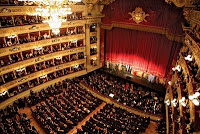
Fourteen Italian opera houses are currently financed almost entirely by the government, with a total budget of $321 million per year. The musicians, choral singers, and stagehands affected by the strike fear that they will face pay cuts and limited outside work as a result of the decree, and many are organizing free concerts in support of themselves and their profession. Others worry that the budget cuts will affect the cultural pride and tradition Italians find in opera.
The decree, which was induced by the current economic crisis, must be passed into law within 60 days in order for it to take effect. Minister of Culture Sandro Bondi says that it is still possible for the decree to be changed to reflect some of its current criticisms, and that he plans to will meet with union representatives.
Teatro Regio in Turin, Teatro Verdi in Trieste, Teatro Comunale in Bologna, Rome’s Teatro dell’Opera and Accademia Nazionale di Santa Cecilia, Florence’s Teatro del Maggio Musicale Fiorentino, and Milan’s Teatro alla Scala, have all cancelled or postponed performances due to the strike. Check each theatre’s Web site for updated performance schedules and refund information, if you have already purchased tickets. — Elaine Murphy
